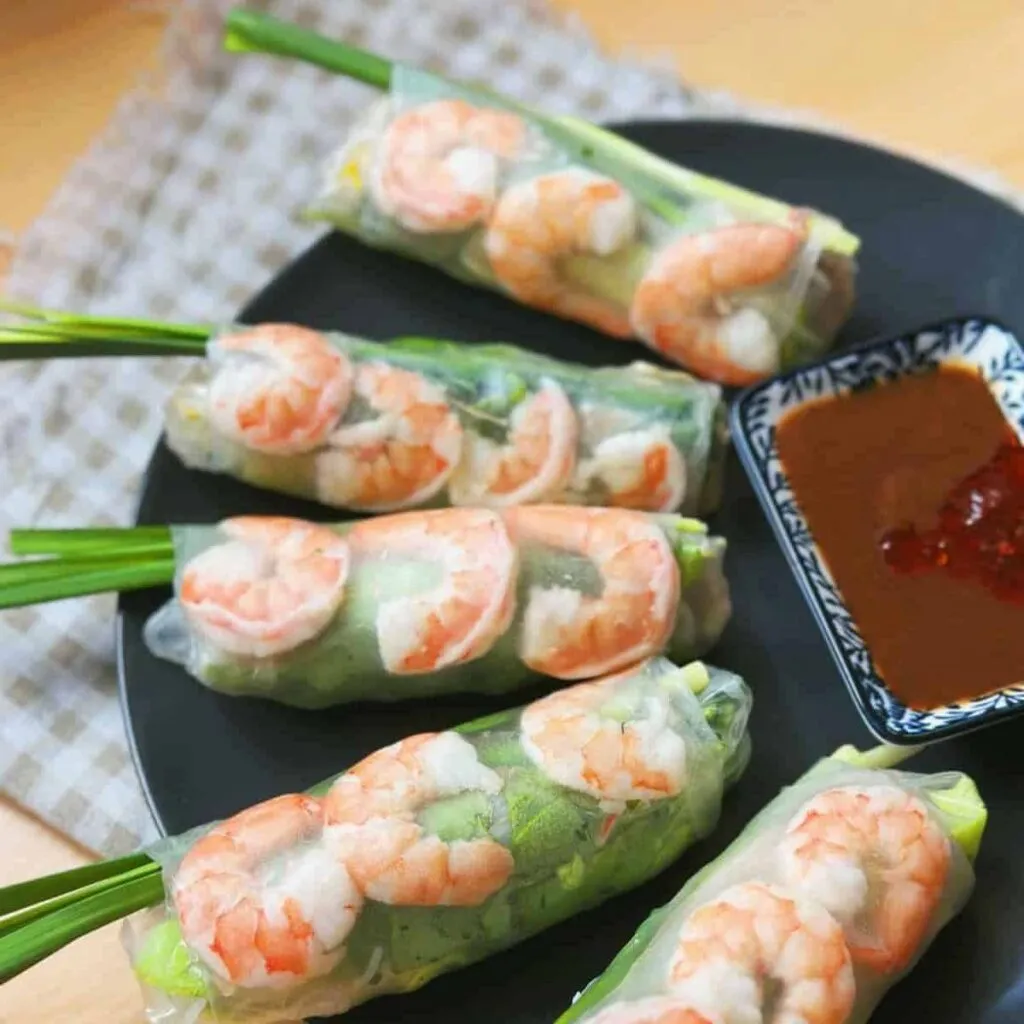Canh Bún isn’t as famous as Phở, but this humble, rustic noodle soup instantly takes me back to Saigon’s streets. I made a big pot this week—hearty, nostalgic, and full of comfort—and had to share the recipe with you!
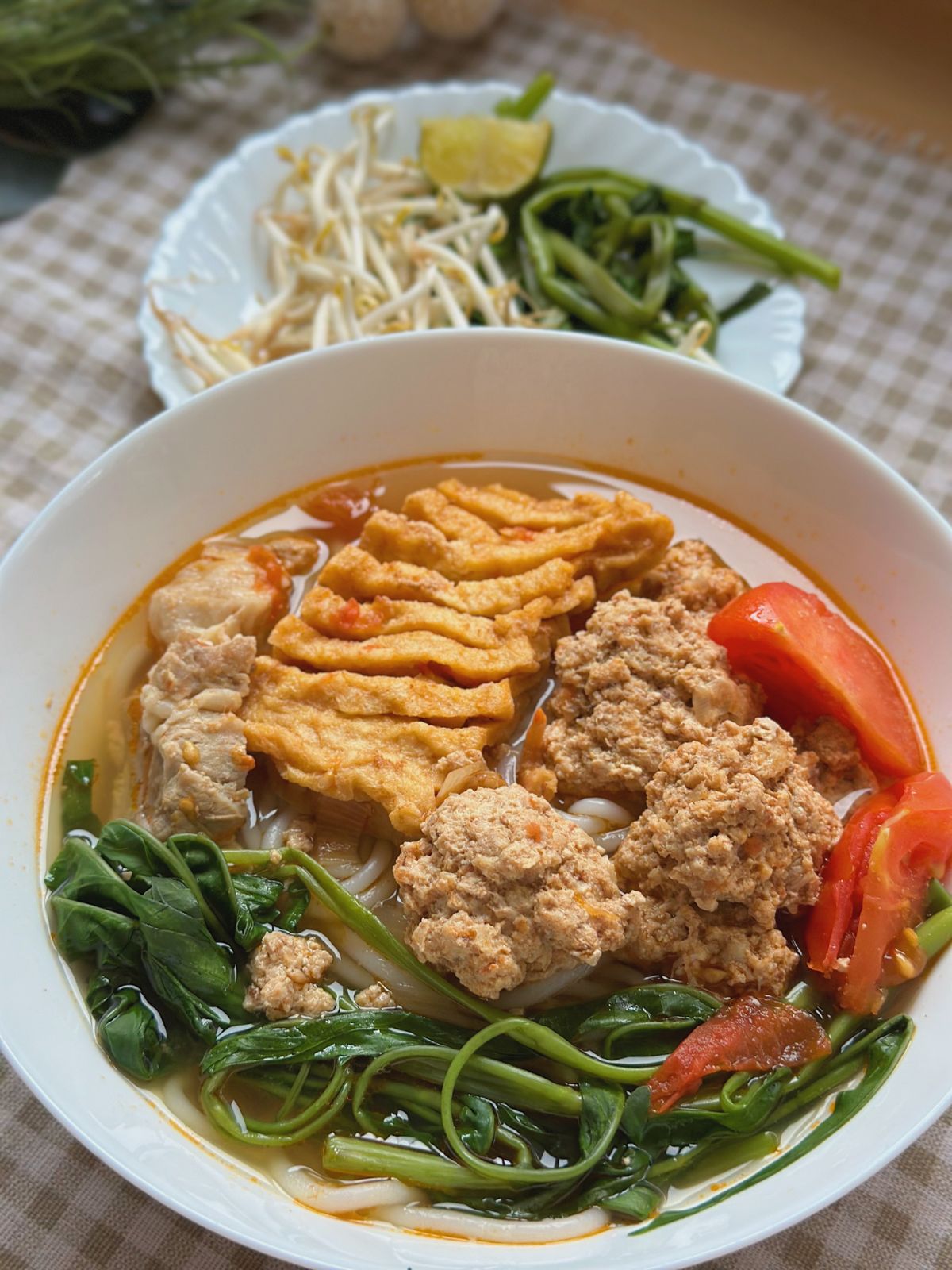
What is Canh Bún?
If you’re in a hurry and just want to get cooking, feel free to jump into the recipe card.
Canh Bún is a Northern Vietnamese crab noodle soup, made with tiny rice paddy crabs—the ones you’d find in fields, not the sea. Simple, hearty, and packed with character, it’s the kind of dish that sticks with you.
Like Phở, Bún Mọc or Bánh Cuốn, Canh Bún traveled south after 1954 with Northern Catholics. And just like those dishes, it evolved. In the South, it started looking a lot like Bún Riêu.
In Saigon today, street vendors often sell Canh Bún, Bún Riêu, and Bún Ốc side by side—they all share that tangy, crab-and-tomato broth.

So how do you tell them apart? Canh Bún uses thick, round rice noodles and is topped with blanched water spinach. Bún Riêu, on the other hand, comes with thinner noodles and shredded water spinach and banana blossoms. The broth in Canh Bún usually has a little extra zing from tamarind, too.
Head back up North, and it changes again. Northern Canh Bún is more like a “dry” noodle soup like Mì Quảng—less broth, more noodles, with blanched water mimosa (rau nhút) instead of water spinach.
Ingredients
Crab Paste (Riêu Cua) – The Soul of the Soup

Canned Crab Paste (Riêu Cua): Look for this in jars at Asian grocery stores. I’m using two brands here to boost flavor, but just one is perfectly fine.
Ground Pork, Eggs, Dried Shrimp & Crab Meat: These get mixed into the crab paste before cooking. The crab meat is a bonus — I added some leftovers from Chả Trứng Hấp (steamed egg meatloaf) I made earlier in the week.


Broth Base

Pork Ribs or Pork Bones: Either works well to give the broth that meaty depth.
Dried Shrimp: Adds big umami. You’ll also see it in many noodle soups like Hủ Tiếu and Bánh Canh.
Onion & Tomato: For a natural sweetness and rounder flavor.
Paprika Powder: In Vietnam, annatto oil gives the soup its signature red hue. I use paprika oil instead.
Lemongrass (Optional): Just one stalk is enough to add a light, citrusy fragrance.
Fish Sauce, Rock Sugar, Chicken Powder: Classic Vietnamese broth seasonings.
Toppings – Build Your Bowl!
Water Spinach (Ong Choy): A must-have for Canh Bún. Quickly blanched and added on top for crunch and freshness.
Fried Tofu: These little golden cubes soak up the broth — so satisfying.
Optional Add-Ons: Pork blood, pork hock, rice snails (ốc), or Vietnamese pork roll (Chả Lụa).
Noodles & Sides – The Final Touch
Thick Round Rice Noodles: These are the same ones used in Bún Bò Huế. They’re thick, chewy, and hold the broth beautifully.
Mắm Tôm (Fermented Shrimp Paste): A bold Northern condiment that brings serious depth. Not everyone loves it — but if you do, a little goes a long way.
Vietnamese Herbs & Veggies: Serve with bean sprouts, Vietnamese balm (kinh giới), and perilla leaves (tía tô) for freshness and texture.
Tamarind Sauce (Optional): A spoon of tamarind sauce at the end adds a gentle sour kick. Totally optional — but highly recommended!
Instructions
Step 1: Prepare the Broth
- Wash the dried shrimps.
- Parboil the pork ribs with a pinch of salt, then rinse them thoroughly.
- In a pot, combine the parboiled ribs, water, onion, lemongrass, dried shrimps, salt, and rock sugar. Simmer over medium-low heat for 1 hour, skimming off any scum that rises to the surface.
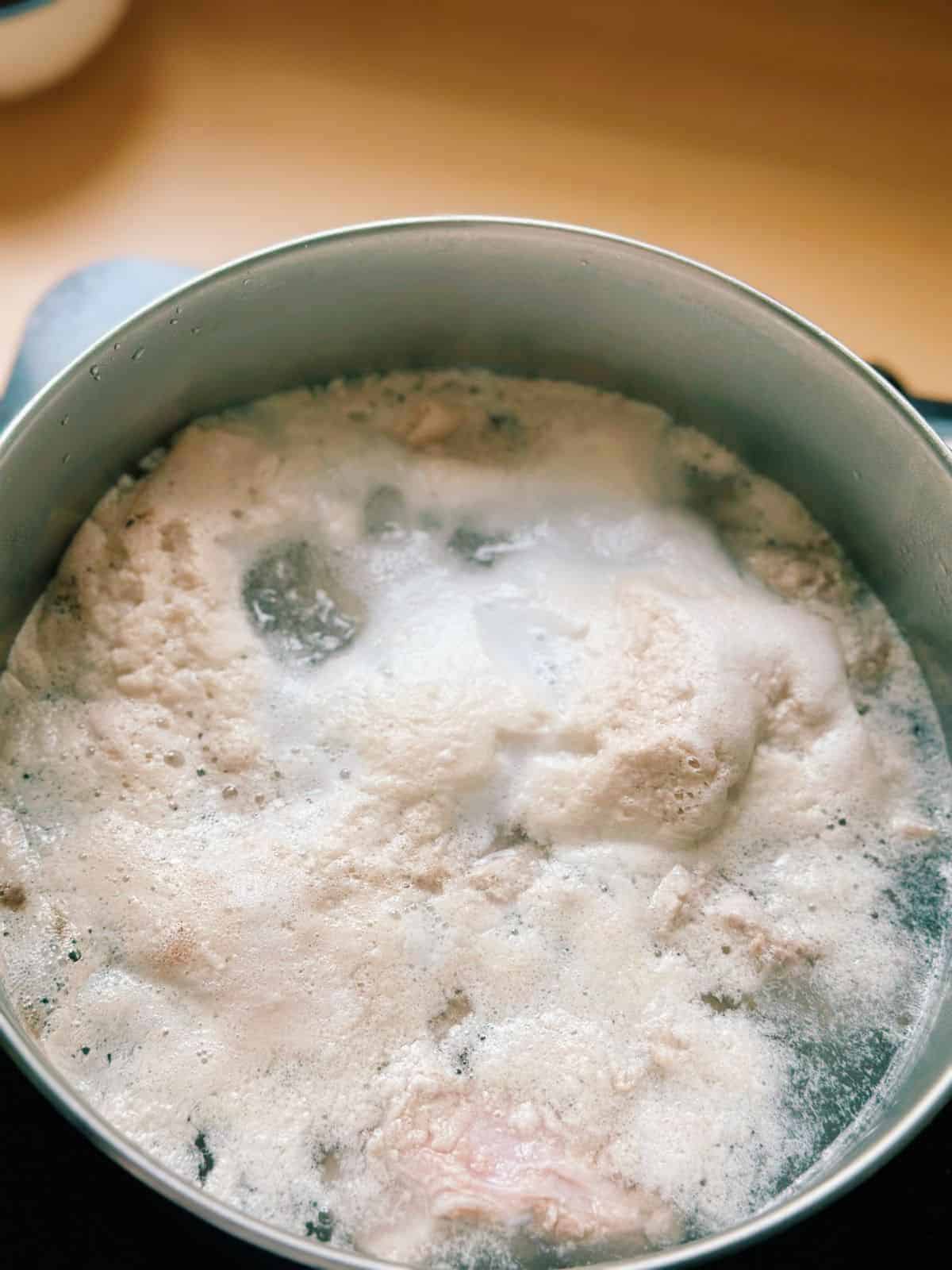
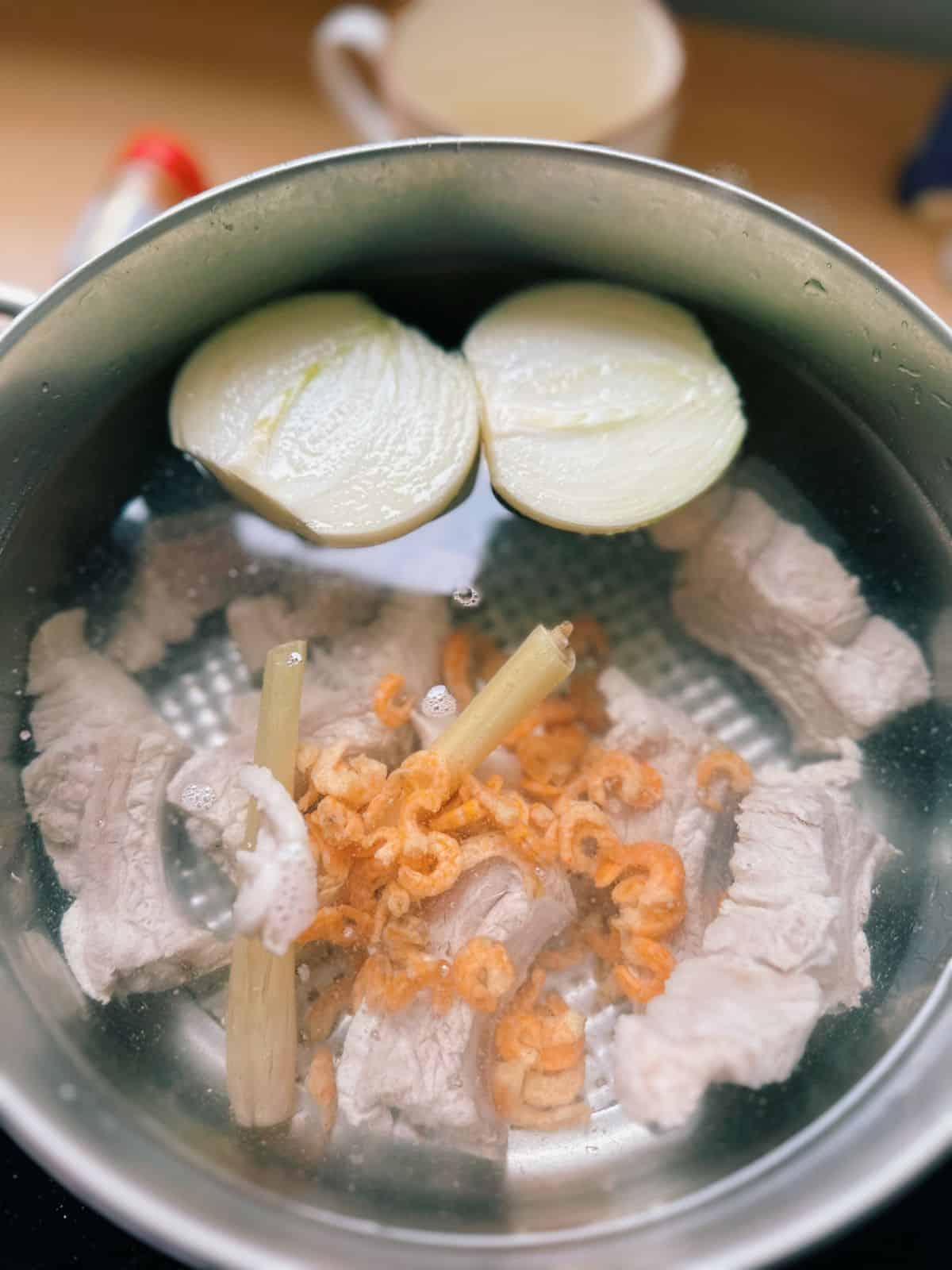
Step 2: Cook the Tomatoes
- Heat some cooking oil in a pan over medium-low heat. Add 1 tablespoon paprika powder and cook for about 3 minutes to infuse the oil with color.
- Add sliced shallots to the paprika oil and sauté until fragrant.
- Add 2/3 of the tomato wedges and stir-fry with a splash of fish sauce until soft and fully cooked.
- Transfer the tomatoes and any pan juices to the broth. Add fried tofu to the broth.
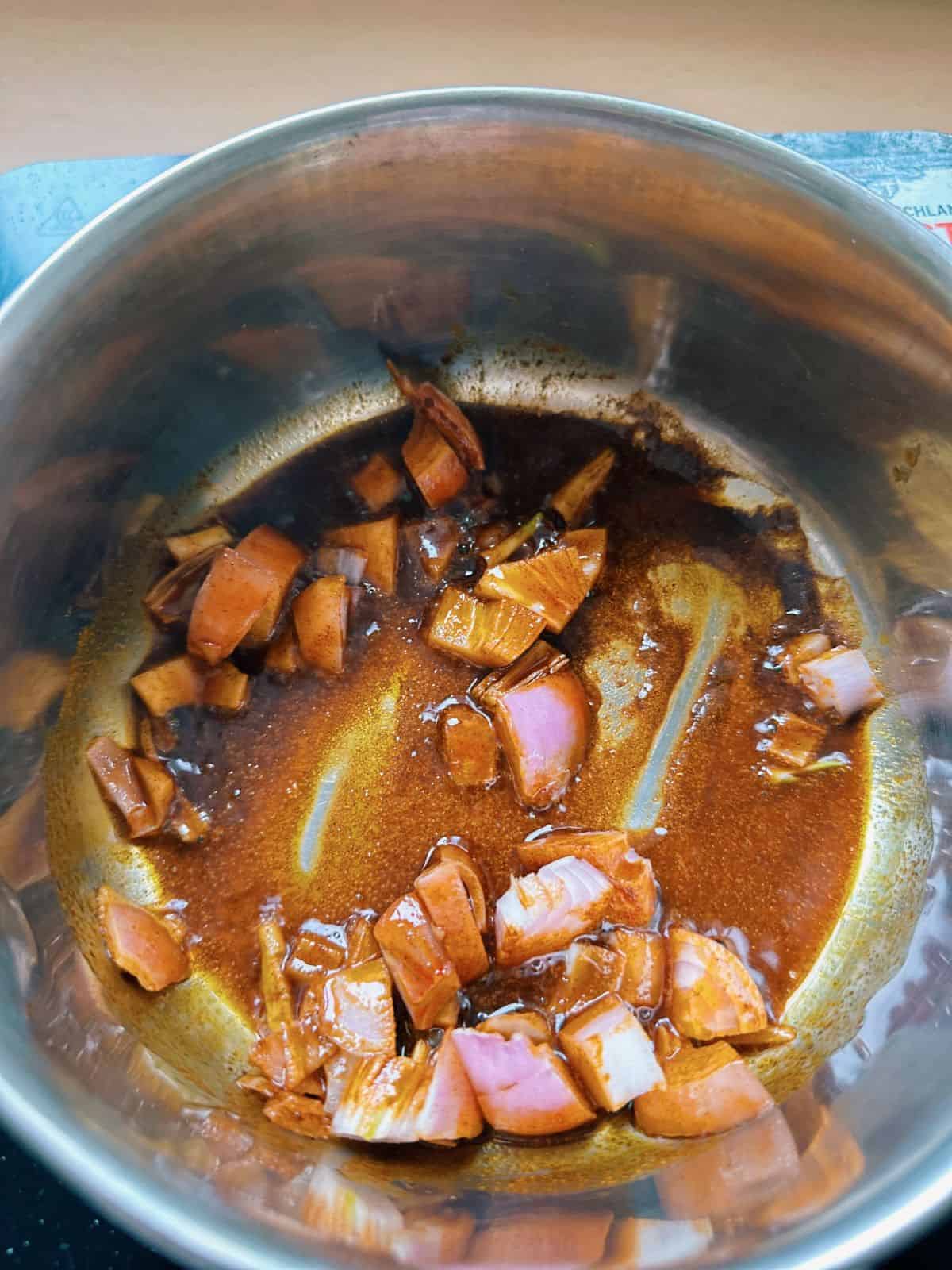
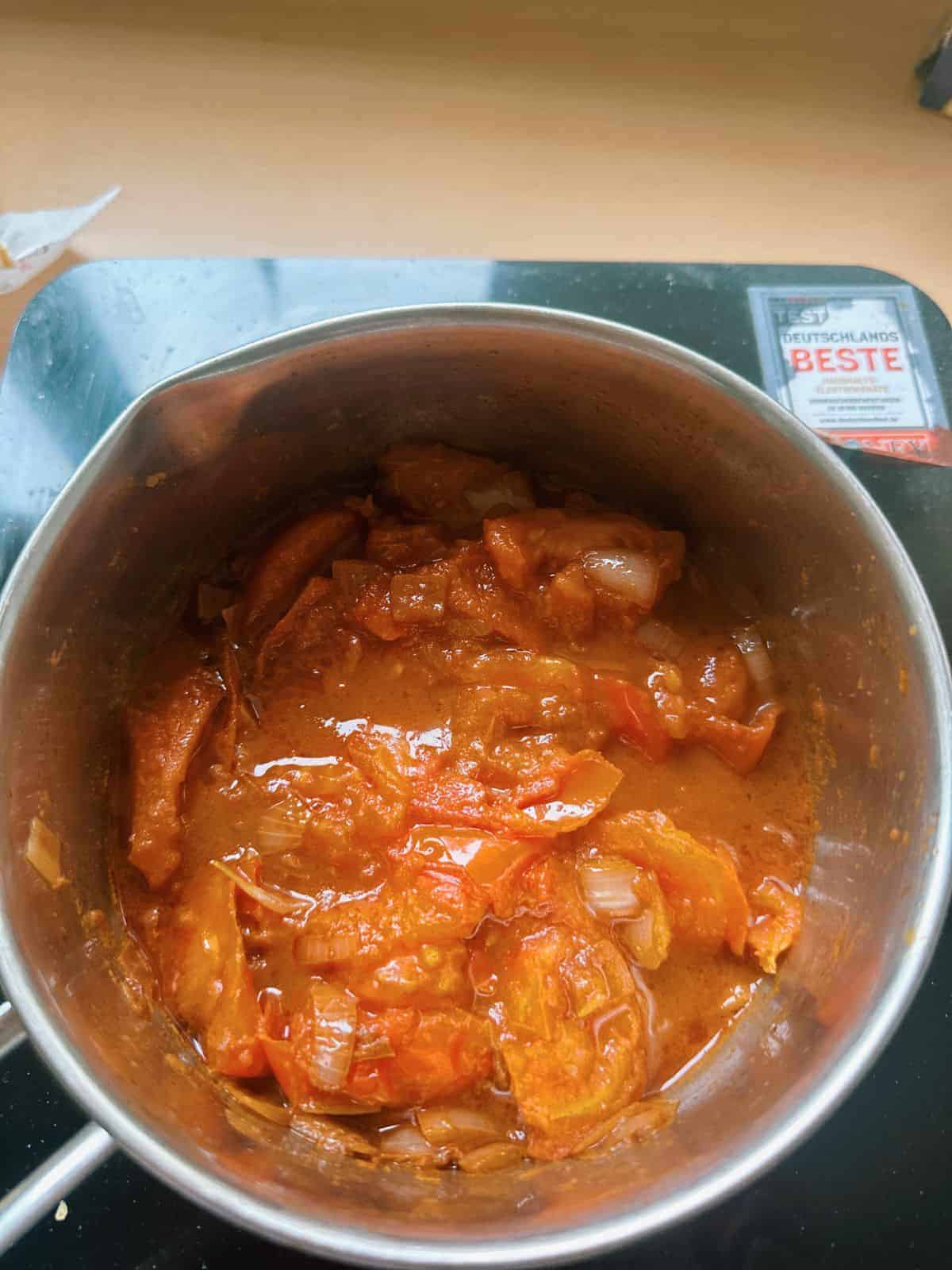
Step 4: Prepare & Cook Crab Paste (Riêu Cua)
- Rinse the dried shrimps and soak them in water until soft. Drain, keeping the soaking water to add to the broth later.
- Blend the shrimps in a food processor until fluffy, like cotton floss.
- In a bowl, mix ground pork, crab meat, blended shrimps, and eggs. Season with fish sauce and sugar. Taste-test a small portion and adjust seasoning. Refrigerate if not using immediately.
- Using two spoons, scoop portions of the crab mixture and gently drop into the simmering broth over medium-low heat.
“Riêu cua” is ready when it floats to the surface. - Add the remaining tomato wedges. Season the broth with fish sauce and chicken powder—slightly saltier than desired since it will dilute when served with noodles.
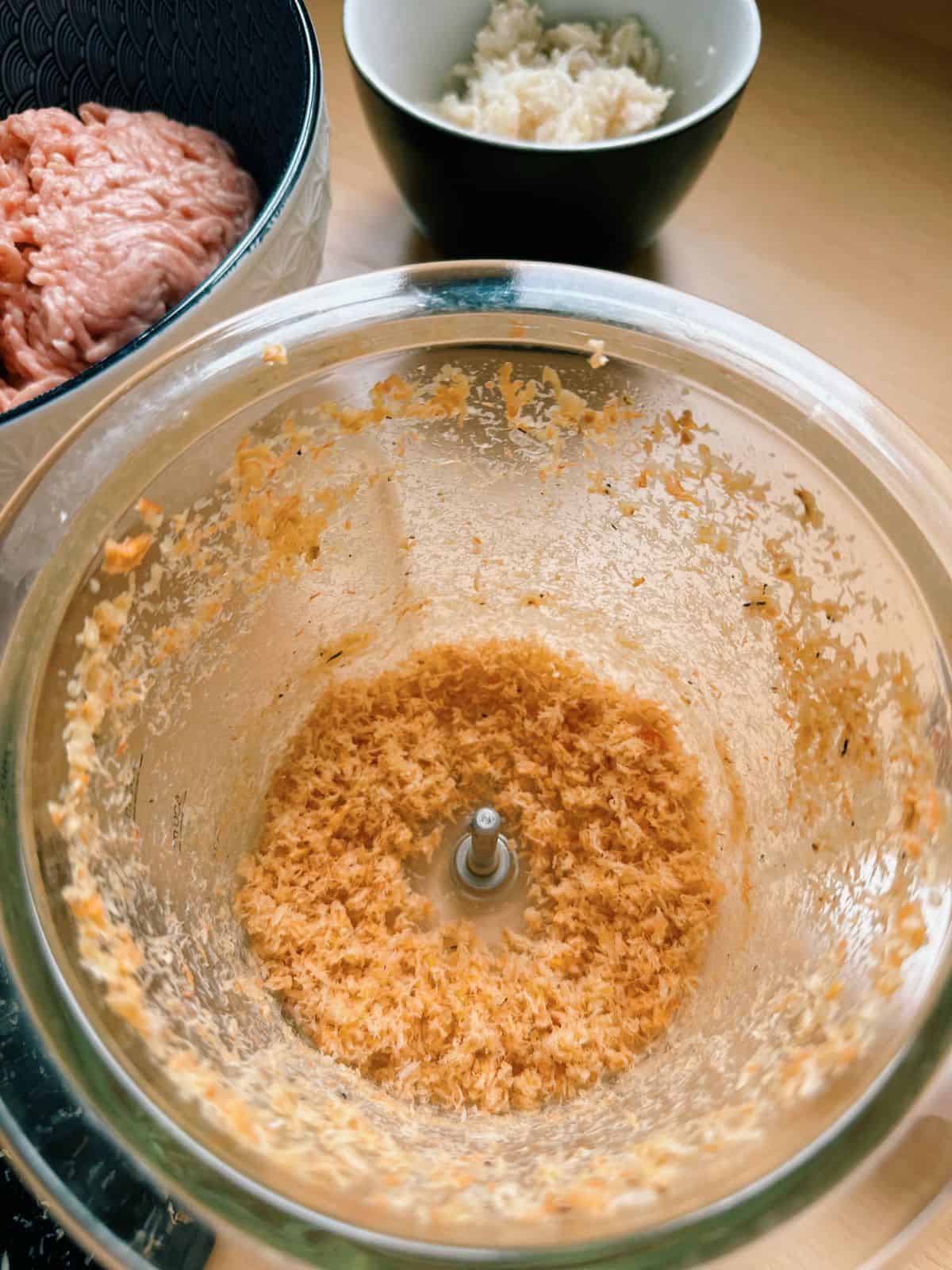
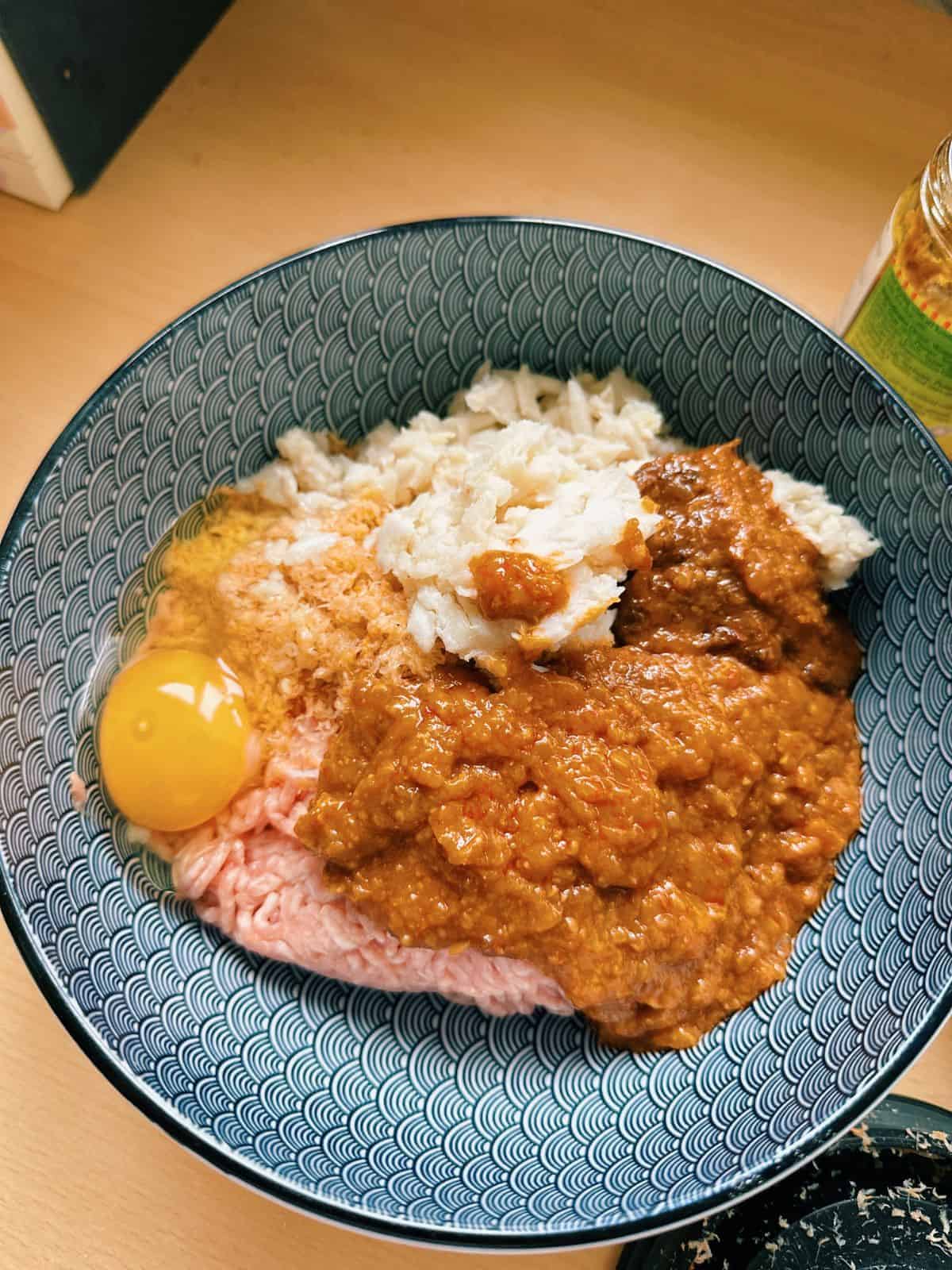
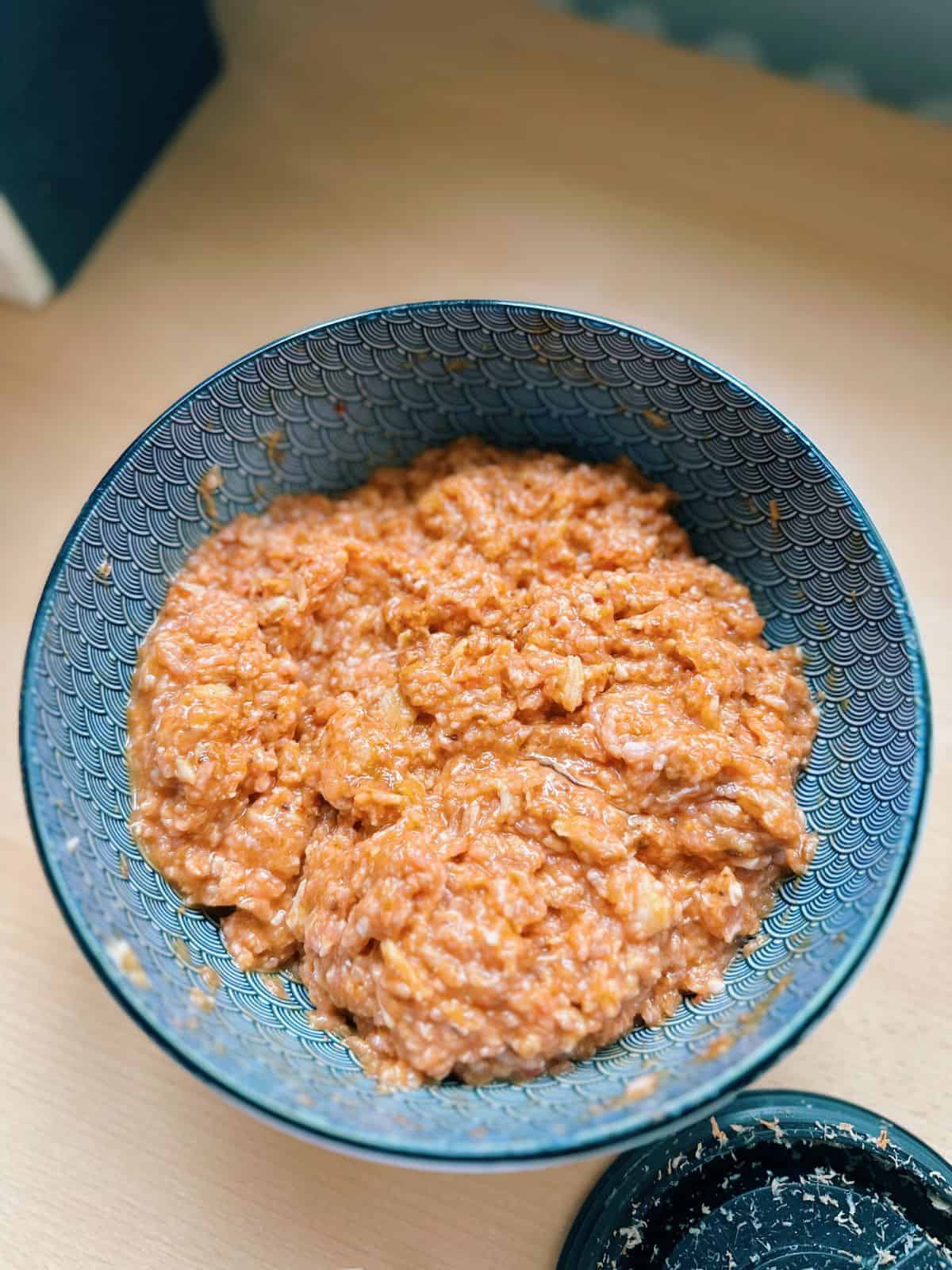
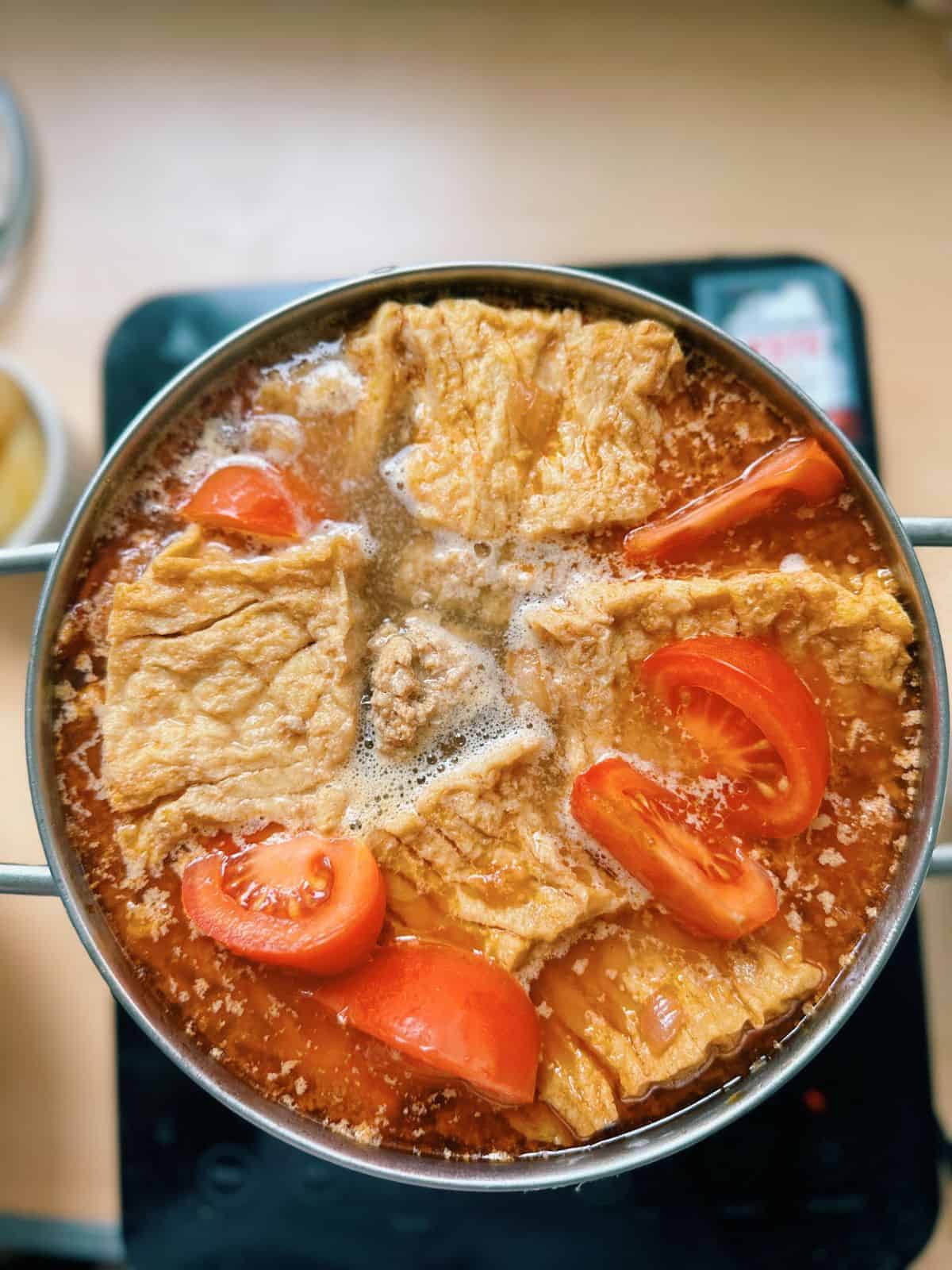
Step 6: Cook the Rice Noodles
- Soak thick rice noodles for at least 2 hours.
- Cook the noodles in cold water to prevent breaking. Check doneness every few minutes.
- Rinse thoroughly with cold water until clear, then drain.
Step 7: Blanch the Water Spinach
- Cut water spinach into 8-inch (20 cm) pieces.
- Wash thoroughly with multiple soaks and rinses.
- Blanch in salted boiling water for about 1 minute. Drain.
Step 8: Assemble and Serve
- In bowls, layer noodles, pork ribs, crab paste, tofu, water spinach, and tomatoes.
- Pour the hot broth over everything.
- Garnish with green onions and cilantro.
- Adjust the flavor with mắm tôm and tamarind sauce (or lime) as desired. Enjoy!
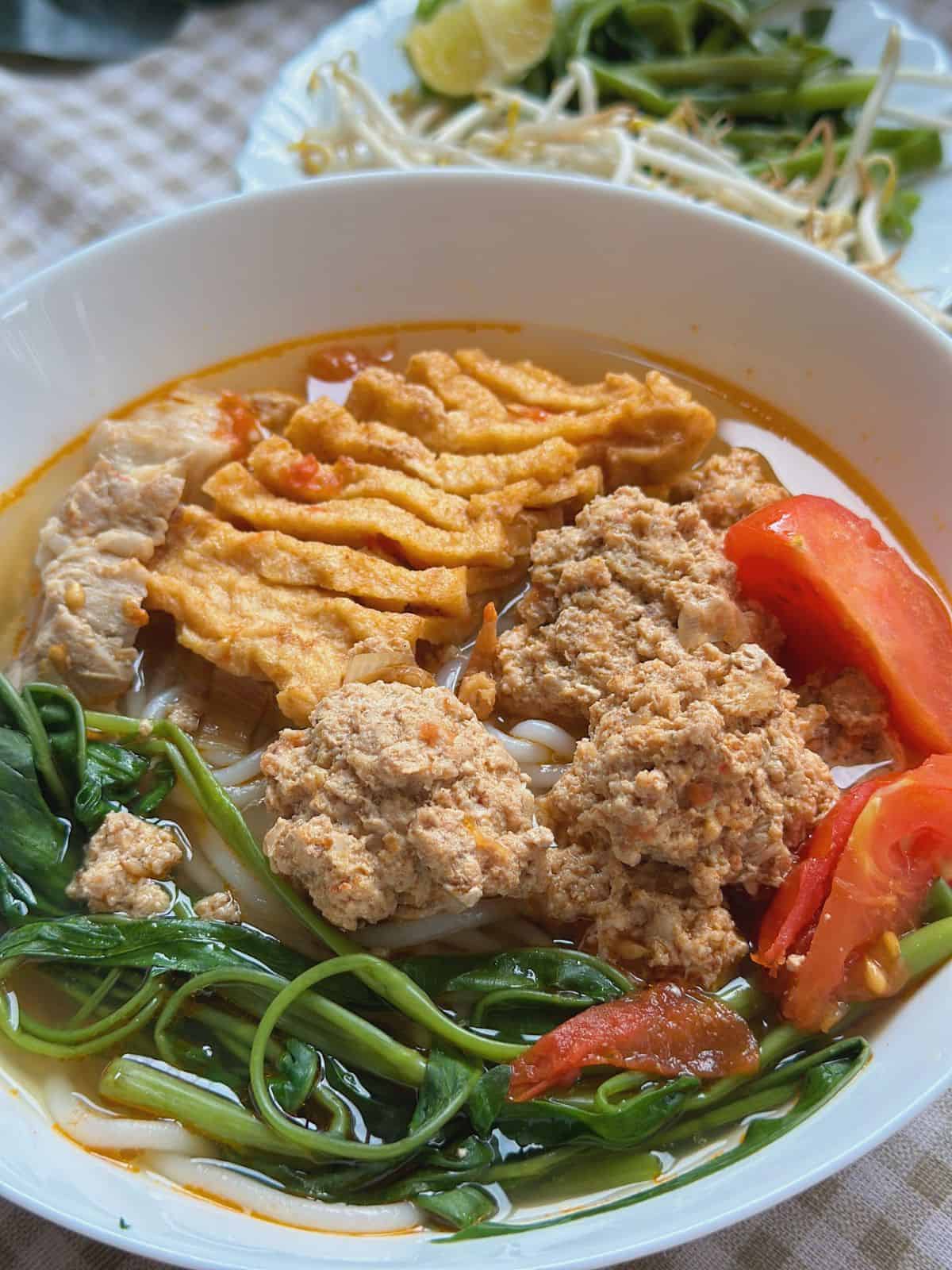
Authentic Vietnamese recipes, straight from the heart of Vietnam

(Rice Noodle Salad with Stir-fried Beef)

(Vietnamese Sizzling Pancakes)

Canh Bún (Vietnamese Crab Noodle Soup with Water Spinach)
Ingredients
Broth
- 1 pound pork ribs (450g)
- ⅛ cup dried shrimps (30g)
- 1 bulb onion
- 1 stalk lemongrass (optional)
- 1 tbsp salt (to your taste)
- 1 tbsp rock sugar (15g) (granulated sugar is ok)
- 1 tbsp chicken powder (to your taste)
- 3 tbsp fish sauce (to your taste)
- 8.5 cup water (2 litesr)
- 3 tomatoes (cut into wedges)
- 1 bulb shallot (thinly sliced)
- 1 tbsp paprika powder
- 3 tbsp cooking oil
- Fried tofu
Crab Paste (Riêu Cua)
- 1 pound ground pork (450g)
- ⅛ cup dried shrimps (30g)
- 4.4 oz crab meat (125g) (optional)
- 4 tbsp canned crab paste (Bún Riêu Cua seasoning)
- 1-3 eggs
- fish sauce (to your taste)
- sugar (to your taste)
Other ingredients
- 1 package Bún Bò Huế Thick Rice Noodles
- 1 bunch Water Spinach (Ong Choy)
- Mắm Tôm (fermented shrimp paste)
- Tamarind sauce (optional)
- Lime/Lemon (cut into wedges)
- Green onion
- Cilantro
Instructions
Prepare the broth:
- Wash the dried shrimps.
- Parboil the pork ribs with some salt, then thoroughly wash and rinse them.
- Put the pork ribs back to the pot along with water, onion, lemongrass, dried shrimps, salt, and rock sugar. Simmer over medium-low heat for one hour, making sure to skim off any scum that rises to the surface.
- In a pan, heat some cooking oil and 1 tablespoon of paprika powder over medium-low heat for about 3 minutes to infuse the red color from the paprika powder into the oil.
- Add the sliced shallot and sauté until fragrant, then add 2/3 of the tomato wedges. Stir-fry the tomato with some fish sauce until they are soft and fully cooked.
- Transfer all the tomatoes to the broth. Don't forget to scrape all the tomato sauce from the pan—it's the golden liquid.
- Finally, add the fried tofu to the broth.
Prepare the crab paste (riêu cua):
- Rinse the dried shrimps and soak them in water until they become plump and soft. Drain the shrimps, and add the soaking water to the broth.
- Blend the shrimps in a food processor until they get a cotton floss-like texture.
- Mix ground pork, dried shrimp, crab meat, crab paste, and eggs in a bowl. Season the mixture with fish sauce and sugar. To taste, microwave a small portion and adjust seasoning as needed. If not using immediately, refrigerate.
- With two spoons, scoop the crab paste and gently drop it into the simmering broth over medium-low heat. Riêu cua is ready when it floats to the surface. Add the remaining tomato wedges to the broth.
- Season the broth with fish sauce and chicken powder. Keep in mind that the broth should have a slightly saltier flavor than desired as it will dilute when served with noodles.
Cook rice noodles:
- Thicker rice noodles require a longer cooking time than regular ones (at least 30 minutes), so I suggest soaking them for at least 2 hours beforehand.
- When cooking the rice noodles, ensure you use COLD WATER to prevent them from breaking easily. Remember to taste the noodles every few minutes to check their doneness.
- After cooking, rinse the noodles thoroughly in cold water several times until the water runs clear. Drain the noodles well before serving.
Blanch water spinach:
- Cut the water spinach into pieces that are 8 inches (20cm) long.
- Wash the vegetables in water with couple of soaks and rinses.
- In a pot, add salt to the water and blanch the water spinach in boiling water for about 1 minute.
Serve:
- In serving bowls, place the rice noodles, followed by pork ribs, crab paste, tofu, water spinach, and tomato. Pour the broth over the noodles. Garnish with green onions and cilantro.
- Adjust the flavor with mắm tôm and tamarind sauce (or lime) according to your preference. Enjoy!

